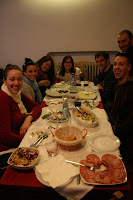Creative writing professor Cynthia Clough was invited to present at an international conference on Italian writer Fabrizia Ramondino.Continuing scholarship is important for the Umbra Institute and its faculty. A week ago Umbra creative writing professor Cynthia Clough presented her paper “Writing Beyond the Red Margin: The Open Notebook of Fabrizia Ramondino,” at the conference in memory of the Neapolitan author (1936-2008). The conference was held at the University of London through the joint efforts of the university’s department of Germanic and Romance Studies and the University of Bath’s Centre for the Study of Contemporary Women’s Writing. A writer of phenomenal output and intense social commitment, Fabrizia Ramondino’s published work includes and crosses the boundaries between poetry, novels, plays, travelogues, memoirs, confession, self-reflection, anthropological, cultural and linguistic comment.
Ramondino’s first novel, Althénopis (1981), concerning the author’s childhood and coming of age in Naples during World War II has been translated into German, French, Spanish and English.  During the 1980s she wrote for various Italian newspapers, especially Il Mattino. Her novelUn giorno e mezzo (1989) was inspired by her social and political activism in Naples in the late 1960s. She collaborated with Mario Martone on the script of the film Morte di un matematico napoletano (1992), which was published by Ubulibri in the same year. Her collaboration with Martone continued with her play Terremoto con madre e figlia, inspired by the 1980 earthquake, which he directed in 1994. She was awarded the literary prizes ‘Premio Napoli’, ‘Premio Settembrini’ (Mestre), ‘Elsa Morante. Isola di Procida’, ‘Grinzane–Cavour’, ‘Civiltà del Mare–S. Felice al Circeo’, ‘Leonardo Sciascia–Grotte’.
During the 1980s she wrote for various Italian newspapers, especially Il Mattino. Her novelUn giorno e mezzo (1989) was inspired by her social and political activism in Naples in the late 1960s. She collaborated with Mario Martone on the script of the film Morte di un matematico napoletano (1992), which was published by Ubulibri in the same year. Her collaboration with Martone continued with her play Terremoto con madre e figlia, inspired by the 1980 earthquake, which he directed in 1994. She was awarded the literary prizes ‘Premio Napoli’, ‘Premio Settembrini’ (Mestre), ‘Elsa Morante. Isola di Procida’, ‘Grinzane–Cavour’, ‘Civiltà del Mare–S. Felice al Circeo’, ‘Leonardo Sciascia–Grotte’.
Dr. Clough, who worked with the Ramondino during the summer of 1997 and considers the author her “Italian mentor,” is currently working on translations of the works and critical studies of the author in order to make her more accessible to an American audience.
Last night at Umbra’s second wine tasting for the semester students tasted a whopping four different wines.


 During the 1980s she wrote for various Italian newspapers, especially Il Mattino. Her novelUn giorno e mezzo (1989) was inspired by her social and political activism in Naples in the late 1960s. She collaborated with Mario Martone on the script of the film Morte di un matematico napoletano (1992), which was published by Ubulibri in the same year. Her collaboration with Martone continued with her play Terremoto con madre e figlia, inspired by the 1980 earthquake, which he directed in 1994. She was awarded the literary prizes ‘Premio Napoli’, ‘Premio Settembrini’ (Mestre), ‘Elsa Morante. Isola di Procida’, ‘Grinzane–Cavour’, ‘Civiltà del Mare–S. Felice al Circeo’, ‘Leonardo Sciascia–Grotte’.
During the 1980s she wrote for various Italian newspapers, especially Il Mattino. Her novelUn giorno e mezzo (1989) was inspired by her social and political activism in Naples in the late 1960s. She collaborated with Mario Martone on the script of the film Morte di un matematico napoletano (1992), which was published by Ubulibri in the same year. Her collaboration with Martone continued with her play Terremoto con madre e figlia, inspired by the 1980 earthquake, which he directed in 1994. She was awarded the literary prizes ‘Premio Napoli’, ‘Premio Settembrini’ (Mestre), ‘Elsa Morante. Isola di Procida’, ‘Grinzane–Cavour’, ‘Civiltà del Mare–S. Felice al Circeo’, ‘Leonardo Sciascia–Grotte’.




